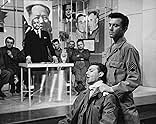Khigh Dhiegh(1910-1991)
- Actor
Khigh Dhiegh (born Kenneth G. Dickerson) was an American character actor from New Jersey. He was typecast in portraying East Asian characters, though his descent was primarily African and European. He stated in autobiographical texts that he had Italian, Portuguese, and Zulu ancestry on his father's side of the family, and Chinese, Egyptian, English, and Spanish ancestry on his mother's side of the family.
As an actor, he is primarily remembered for portraying the Chinese intelligence agent and criminal mastermind Wo Fat in the police procedural "Hawaii Five-O" from 1968 to 1980. His character was the series' most notable villain. Beyond acting, Dhiegh was a Taoist philosopher with a doctorate in theology. He wrote several non-fiction books on philosophy, such as "The Eleventh Wing". He established a Taoist sanctuary in Hollywood, California. In his old age, he served as the rector of a Taoist sanctuary in Tempe, Arizona.
Dhiegh started making jewelry as a hobby in the 1970s. He later sold handcrafted jewelry for a living and in order to financially support his Taoist organizations. During the early 1990s, he promoted the concept of world citizenship in public speaking, and openly criticized nationalism. Posthumously, some of his philosophical works have been re-examined in publications by the Centre for Daoist Studies and the Pacific Lutheran University.
As an actor, he is primarily remembered for portraying the Chinese intelligence agent and criminal mastermind Wo Fat in the police procedural "Hawaii Five-O" from 1968 to 1980. His character was the series' most notable villain. Beyond acting, Dhiegh was a Taoist philosopher with a doctorate in theology. He wrote several non-fiction books on philosophy, such as "The Eleventh Wing". He established a Taoist sanctuary in Hollywood, California. In his old age, he served as the rector of a Taoist sanctuary in Tempe, Arizona.
Dhiegh started making jewelry as a hobby in the 1970s. He later sold handcrafted jewelry for a living and in order to financially support his Taoist organizations. During the early 1990s, he promoted the concept of world citizenship in public speaking, and openly criticized nationalism. Posthumously, some of his philosophical works have been re-examined in publications by the Centre for Daoist Studies and the Pacific Lutheran University.




















